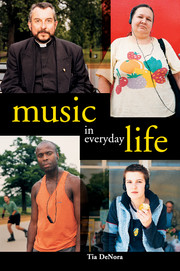5 - Music as a device of social ordering
Published online by Cambridge University Press: 22 September 2009
Summary
‘Pools of order’, writes John Law, ‘are illusory, but even such illusions are the exception. They do not last for long. They are pretty limited. And they are the product, the outcome, or the effect, of a lot of work – work that may occasionally be more or less successfully hidden behind an appearance of ordered simplicity’ (1994:5). Law is writing about a research laboratory at a time of stress, but his observations perfectly introduce the concept of social order as an achievement, an effect of temporal action, and as his description of scientific work makes clear, such action draws upon (and is in turn shaped by) media and materials of all kinds – objects, discourses and technologies.
In daily life, as we have seen, music is one of these materials. This chapter considers music's role as a device of collective ordering, how music may be employed, albeit at times unwittingly, as a means of organizing potentially disparate individuals such that their actions may appear to be intersubjective, mutually oriented, co-ordinated, entrained and aligned. This social calm and the conductivity for social navigation that it facilitates is akin to Law's notion of order's ‘pools’. This notion captures the temporal and achieved dimension of ordering. It gives sociological conceptions of order a tilt towards the ethnomethodological focus on order as an effect of work. At the same time, it creates an important space for culture as a medium of and for this work.
- Type
- Chapter
- Information
- Music in Everyday Life , pp. 109 - 150Publisher: Cambridge University PressPrint publication year: 2000



